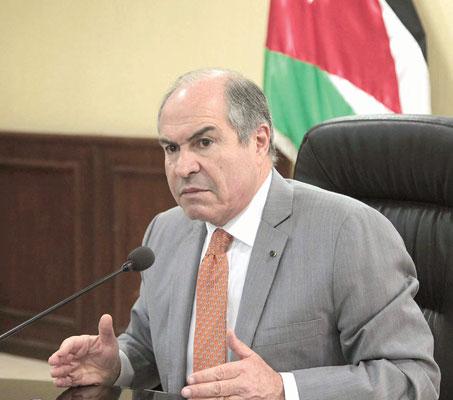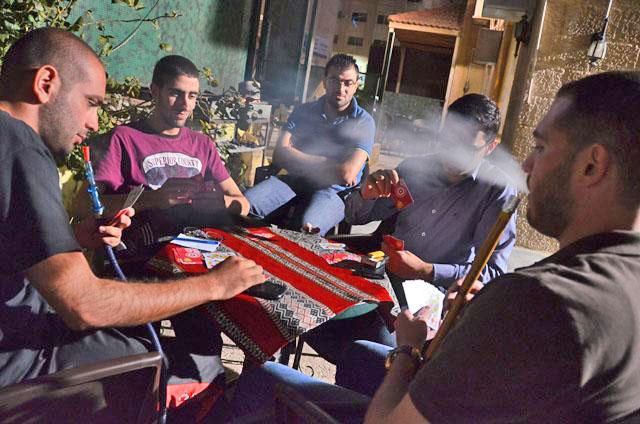You are here
Cabinet discusses with youth challenges facing them
By JT - Mar 10,2018 - Last updated at Mar 10,2018
AMMAN — Prime Minister Hani Mulki and 22 ministers were on Friday in a conversation with 150 young people representing all the Kingdom’s governorates.
The meeting was part of a government’s outreach plan that involves direct engagement with the youth sector, and an opportunity to listen to their views on the challenges they face, before trying to find solutions to their problems, the Jordan News Agency, Petra, reported.
Addressing the young audience, Mulki said that all plans and measures the government implements aim at guaranteeing better life for the young people.
The premier said that Jordan has suffered from a lot of problems over the years, noting that the Kingdom was forced to be engaged in regional issues, out of its pan-Arab and Islamic commitments, that it had nothing to do with, and such engagements have had a heavy price.
He told the youth that he understands what they feel as a result of the hard circumstances facing their generation and the country.
He assured them that solutions are not impossible, but need sacrifices, in an apparent reference to the economic correction measures his government has taken, sending the prices of commodities and services up amid rising rates of poverty, unemployment and inflation.
He noted that when His Majesty King Abdullah called for having a ministry of youth, the reason was not only to promote sports, “which are important”, but to enhance dialogue with the youth over their needs.
Mulki added that there would be further meetings with the youth in other governorates to contact as many young people as possible, noting that the government will benefit from the feedback they receive in such gatherings.
The premier stressed that the economy is “good”, expressing hope to overcome the financial crisis by mid-2019, especially as the government has started a programme to stimulate economic growth that would lead to generating jobs.
Youth Minister Bashir Rawashdeh said that the government has “achieved a lot” in its reform drive, yet the prevailing conditions are not perfect and more collective work has to be done to achieve all the national goals on the agenda.
He acknowledged that young people are not happy with what is happening, calling on all to be aware of the magnitude of challenges the Kingdom has faced during the past seven years at the security and economic levels.
Mulki and the ministers listened to the youth’s demands that mainly focused on finding solutions to unemployment, enhancing youth participation in politics, economic conditions and the importance of finding proper solutions to the public debt challenge, which has reached around $40 billion.
Other young people, who represented the 12 governorates and Petra District, referred to problems in the educational sector, lack of real development opportunities, challenges hindering the establishment of small-sized enterprises, high prices of goods, especially bread, scarce foreign investments and insufficient infrastructure services.
Deputy Prime Minister and Minister of State for Economic Affairs Jafar Hassan said that 70,000 to 80,000 jobs have to be generated to address unemployment, highlighting the role of the private sector in addressing such an issue.
Hassan noted that some 70 per cent of female graduates do not join the labour market, adding that Jordan is among the weakest Arab countries in terms of women participation in the labour market.
Minister of Political and Parliamentary Affairs and Minister of State Musa Maaytah said that the state cannot force the youth to join political parties, noting that although the Kingdom has 47 licensed parties, their performance is still below expectation.
Higher Education Minister Adel Tweisi stressed that universities provide opportunities for the youth to deal with democratic and political fields, but the problem lies in the fact that young people shun such activities.
For his part, Minister of State for Investment Affairs Muhannad Shehadeh said young people have to develop their skills, especially in technology and English language, to be ready to join the local market or work abroad, adding that Jordan seeks to be a centre for manufacturing industries and a hub for Syria and Iraq rebuilding.
Stressing that the technological infrastructure is in place and effective, ICT Minister and Minister of Public Sector Development Majd Shweikeh cited that access to Internet has reached 100 per cent and while the use of mobile phones reached 150 per cent.
Education Minister Omar Razzaz highlighted the importance of innovation, skill development and collective work, calling on the youth to increase their participation in voluntary activities.
On unemployment, Labour Minister Samir Murad stressed that the government has limited ability to provide perfect solutions, explaining that the private sector is more capable than the public sector of creating jobs for qualified employees.
Related Articles
AMMAN — On World Youth Skills Day, young Jordanians cast light on the skills needed to face today’s challenges. Observed annually on Ju
AMMAN — Prime Minister Hani Mulki on Friday said that the current economic situation in Jordan is not the most difficult when compared to pr
AMMAN — As more than 70 per cent of Jordanians are under 30, the Kingdom needs to bolster government-led youth initiatives, foster youth pol



















